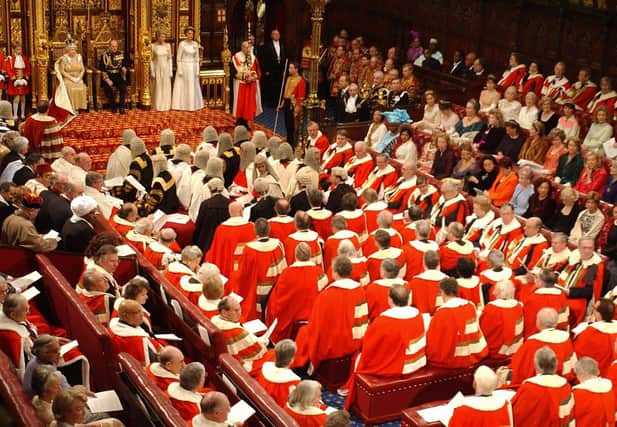House of Lords reform? UK's unelected peers won't even allow feudal hereditary principle to be abolished – Willie Sullivan


But when it comes to problems in our democracy, it’s not only the Commons we have to worry about.
The House of Lords already sets a low bar – an unelected, unaccountable chamber which often seems more like a private members club for ex-MPs and party donors than a credible legislature fit for the 21st century – and a far cry from the modern, proportionally elected parliament we have here in Scotland.
Advertisement
Hide AdAdvertisement
Hide AdThe power of the Prime Minister to appoint allies and supporters is virtually unrestrained, and despite attempts to reduce its numbers, the Lords continues to expand – with currently over 800 peers able to take their seats.
But, beyond the raft of political appointees, it’s the continued existence of hereditary peers that should cause the most embarrassment in our so-called democracy. These 92 aristocrats are given a lifetime seat to make our laws – accountable to nobody but themselves.
In 2021, their place is effectively confirmed as a birth right, passed down through generations. They have a vast say over the issues that shape our daily lives, yet the public are powerless and unable to hold them to account.
When a hereditary retires or dies another one is ‘elected’ in their place – with the remaining aristocrats playing the role of voters in what must be the most absurd elections in British politics.
There have so far been seven of these so-called elections in 2021 – filling vacancies that occurred during the early stages of the pandemic when the process was suspended.
One peer, Labour’s Viscount Stansgate (ironically the son of Tony Benn, who famously rejected his hereditary peerage) was ‘elected’ unopposed to his seat after no other candidates came forward to fill the Labour vacancy.
In recent years, Labour peer Lord Grocott has waged a personal war to end these absurd by-elections. Earlier this month he introduced a bill to end the practice – his fourth attempt in five years.
But each time his bill has made it to the floor, his attempts have been consistently thwarted by hereditary peers and, with the government refusing to back his proposals, there is no hope of them passing.
Advertisement
Hide AdAdvertisement
Hide AdHis bill should be uncontroversial – a small and common-sense reform that would end the worst peculiarity of the unelected Lords and dozens of lawmakers inheriting their roles though little more than the circumstance of their birth. A feudal relic that has survived far beyond its lifespan.
But even this small fix was, for many unelected lords, a step too far.
The truth is we need comprehensive reform of the House of Lords. Replacing this unelected and outdated embarrassment with a modern Senate of the Nations and Regions – fully elected and representing all people in all parts of the UK.
Until we have a chamber that is accountable to the people, not just to peers themselves, then the disproportionate power of a handful of aristocrats will remain and the House of Lords will continue as an embarrassing stain on our democratic system.
Willie Sullivan is senior director of the Electoral Reform Society Scotland
A message from the Editor:
Thank you for reading this article. We're more reliant on your support than ever as the shift in consumer habits brought about by coronavirus impacts our advertisers.
If you haven't already, please consider supporting our trusted, fact-checked journalism by taking out a digital subscription.
Comments
Want to join the conversation? Please or to comment on this article.
